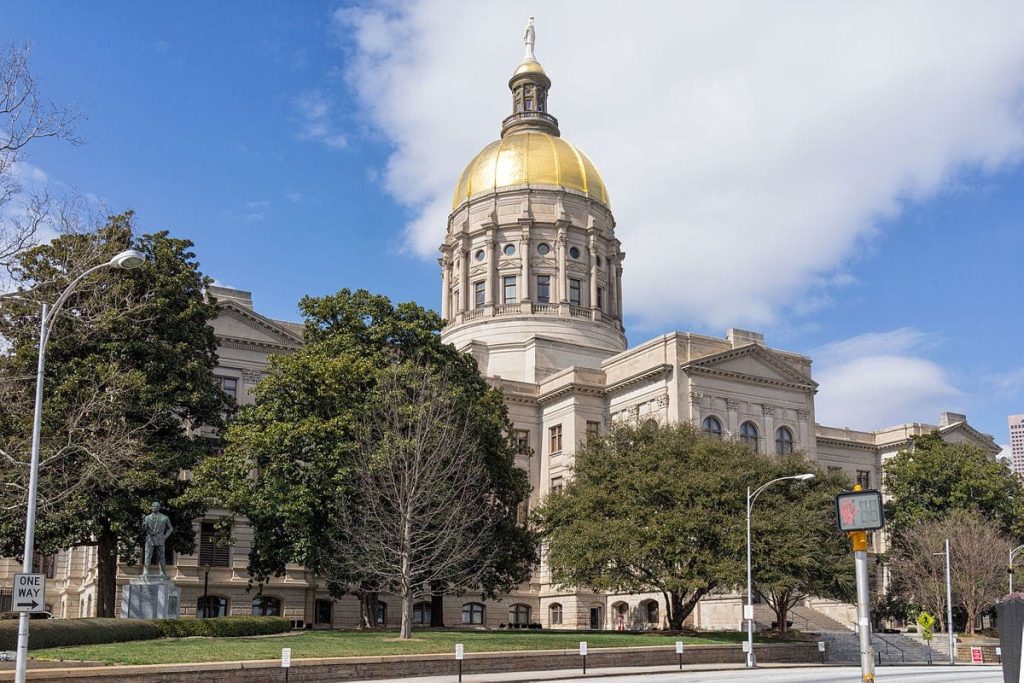Thursday, March 11 completed Legislative Day 31 for the General Assembly, leaving 9 legislative days. Crossover Day, Legislative Day 28, was Monday, March 8. The legislature will convene for Legislative Days 32-35 next week. We highlight some of the key legislative developments the Gwinnett Chamber is tracking:
Economic Development/Business Climate
HB 112, Introduced by Rep. Trey Kelley (R-Cedartown), passed the House 99-68. The COVID liability protection bill extends the sunset date out another year to July 14, 2022. The bill was introduced in the Senate and has recently passed favorably by the Judiciary Committee.
HB 150, introduced by Rep. Bruce Williamson (R-Monroe), would prohibit local governments from implementing policy that bans utility service based on the type of source of energy or fuel. The House passed the bill on Monday 103-62. The Senate Regulated Industries and Utilities Committee favorably reported by substitute.
HB 182, introduced by Rep. Marvin Lim (D-Norcross), would create an Entrepreneur Learner’s Permit program that helps first-time entrepreneurs by waiving some of the obligations when filing for a new business. It has been assigned to the House Economic Development and Tourism Committee. It did not pass out of the House before Crossover Day.
HB 183, introduced by Rep. Marvin Lim (D-Norcross), would expand the current Georgia Fair Business Practices Act (FBPA) to permit businesses to make claims, in a “representative” capacity, against unfair or deceptive trade practices by businesses. Currently, the FBPA only allows consumers to make claims. It has been assigned to the House Judiciary Committee. It did not pass out of the House before Crossover Day.
HB 306, sponsored by Representative Stan Gunter (R-Blairsville), would allow corporations to hold shareholders’ meetings remotely. On Wednesday February 24, the House passed the measure 169-0. It was introduced and referred to the Senate Judiciary Committee.
HB 398, introduced by Rep. Bruce Williamson (R-Monroe), removes the jobs cap from the jobs tax credit. The bill passed the House Ways and Means Committee last Tuesday, the 16th. It did not pass out of the House before Crossover Day.
HB 479, sponsored by Rep. Bert Reeves (R-Marietta), would reform the roughly 150-year-old statute that allows any Georgian to arrest a suspected offender. This bill would still allow business employees and security officers to detain lawbreakers and off-duty police officers to make arrests when outside their jurisdiction. The bill is a continuation of Governor Kemp’s push from last year’s passage of hate-crimes law. The House voted 173-0 and the bill was introduced in the Senate and referred to the Senate Judiciary Committee.
HB 593, sponsored by Rep. Shaw Blackmon (R-Bonaire), would increase the standard deduction from $4,600 to $5,400 and $6,000 to $7,100 for individuals and jointly filing married couples, respectively. It would allow Georgians to save up to $75 per year on their income taxes and cost the state between $100 million and $150 million per year in foregone revenue. If approved, the changes would take effect on January 1, 2022. It passed the House on March 3 and has been introduced in the Senate and referred to the Senate Finance Committee.
HR 11, authored by Rep. Wes Cantrell (R-Woodstock), would create the House Study Committee on Innovative Ways to Maximize Global Talent in Georgia. The House Small Business Development Committee favorably reported by substitute.
SB 6, introduced by Sen. John Albers (R-Roswell), passed by the Senate 51-0 and has been sent to the House Ways and Means Committee. The bill would allow the Chairs of the Senate Finance Committee and the House Ways and Means Committee to request an economic analysis on up to five tax incentives each year.
SB 33, introduced by Sen. Clint Dixon (R-Buford), provides victims of human trafficking a civil cause of action against perpetrators and gives the Attorney General a cause of action against perpetrators of human trafficking in certain circumstances. It passed out of the Senate 50-0 and was read for the second time in the House on February 17.
SB 34, introduced by Sen. Clint Dixon (R-Buford), allows human trafficking victims to change their legal name without the usually required public ad in their legal organ. It passed out of the Senate 50-0 and was read for the second time in the House on February 17.
SB 45, introduced by Sen. Bruce Thompson (R-White), would speed the process of occupational and professional licensure for new Georgia residents. It passed the Senate 37-15 and was introduced in the House.
Transportation
SB 98 by Sen. Brandon Beach (R-Alpharetta) and HB 588 by Rep. Rick Jasperse (R-Jasper) establish rules for the Georgia Freight Railroad Program in GDOT’s budget and provides guidance for public-private partnerships. SB 98 passed out of the Senate 53-1 and was read for the second time in the House on March 10. HB 588 passed out of the House 166-0 and has been referred to the Senate Finance Committee.
SR 102, introduced by Sen. Steve Gooch (R-Dahlonega), creates the Georgia Commission on E-Commerce and Freight Infrastructure Funding. This resolution was passed by the legislature and awaits the Governor’s signature.
Education
HB 67, introduced by Rep. Chuck Martin (R-Alpharetta), allows institutions at the University System of Georgia and the Technical College System of Georgia to carry forward certain unexpended revenues into the next fiscal year. It passed out of the House 171-0 and has been referred to the Senate Committee on High Education.
SB 88, introduced by Sen. Russ Goodman (R-Cogdell), helps grow the teacher pipeline throughout recruitment, mentorship, and retention. It passed the Senate 50-0 and was read for a second time in the House on February 22.
Healthcare
SB 256, introduced by Sen. Dean Burke (R-Bainbridge), would give the state the authority to reorganize county boards of health. It passed out of the Senate 37-14 and was read for the second time in the House on March 10. The chamber is examining its potential impact on the Gwinnett, Newton, and Rockdale County Public Health Departments.
Arts, Tourism & Entertainment
HB 226, introduced by Rep. Gregg Kennard (D-Lawrenceville), would restore tax-exempt status for the ticket sales at non-profit performing arts businesses in Georgia. The status expired July 2020. The chamber announced its support of the bill. HB 226 language was added to HB 586, Georgia Economic Recovery Act of 2021. The bill is sponsored by Sam Watson (R-Moultrie) and Rep. Bonnie Rich of the Gwinnett House delegation is a co-sponsor. Rep. Shaw Blackmon (R-Bonaire), Chair of the House Ways and Means Committee, is also a co-sponsor. It passed the House on March 4 and has been introduced in the Senate and referred to the Senate Finance Committee.





